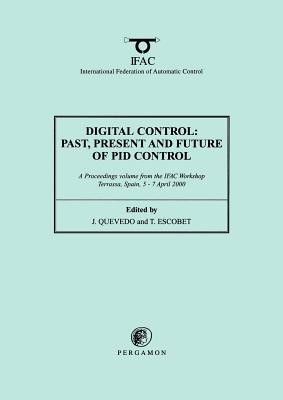
- We will send in 10–14 business days.
- SAVE -10% with code: EXTRA
Digital Control 2000: Past, Present and Future of Pid Control (e-book) (used book) | bookbook.eu
Reviews
Description
At the beginning of the new millennium the PID controller continues to be a key component of industrial control. During this century many different structures of control have been proposed to overcome the limitation of the PID controllers. Because of their simplicity and usefulness, they give a very useful solution to an important part of the industrial processes.
The present-day structure of PID controllers is quite different from the original analog PID controllers. Now the implementation of the PID is based on digital design, these digital PIDs include many algorithms such as anti-wind-up, auto-tuning, adaptive, and fuzzy fine tuning to improve their performances, but the basic actions remain the same.
During the last two decades, the general reluctance of researchers to use PID controllers has begun to disappear. Many of the new capabilities of digital PID controllers have been introduced by the research community. The industrial control users apply these innovations easily, even enthusiastically. PID control has become one of the most important ways for the scientific specialist in control and the users of industrial control to work together.
This workshop was organized so that the scientific world and the industrial control world could meet and discuss the present and future use of PID controllers - the successes and failures of their use and how to determine the limits of performances. This workshop was also useful for learning about control history, since the origin and evolution of PID control can provide us with keys for new development and designs.
EXTRA 10 % discount with code: EXTRA
The promotion ends in 20d.20:22:53
The discount code is valid when purchasing from 10 €. Discounts do not stack.
- Author: J Quevedo
- Publisher: Pergamon
- ISBN-10: 0080436242
- ISBN-13: 9780080436241
- Format: 21 x 29.7 x 3.2 cm, softcover
- Language: English English
At the beginning of the new millennium the PID controller continues to be a key component of industrial control. During this century many different structures of control have been proposed to overcome the limitation of the PID controllers. Because of their simplicity and usefulness, they give a very useful solution to an important part of the industrial processes.
The present-day structure of PID controllers is quite different from the original analog PID controllers. Now the implementation of the PID is based on digital design, these digital PIDs include many algorithms such as anti-wind-up, auto-tuning, adaptive, and fuzzy fine tuning to improve their performances, but the basic actions remain the same.
During the last two decades, the general reluctance of researchers to use PID controllers has begun to disappear. Many of the new capabilities of digital PID controllers have been introduced by the research community. The industrial control users apply these innovations easily, even enthusiastically. PID control has become one of the most important ways for the scientific specialist in control and the users of industrial control to work together.
This workshop was organized so that the scientific world and the industrial control world could meet and discuss the present and future use of PID controllers - the successes and failures of their use and how to determine the limits of performances. This workshop was also useful for learning about control history, since the origin and evolution of PID control can provide us with keys for new development and designs.


Reviews